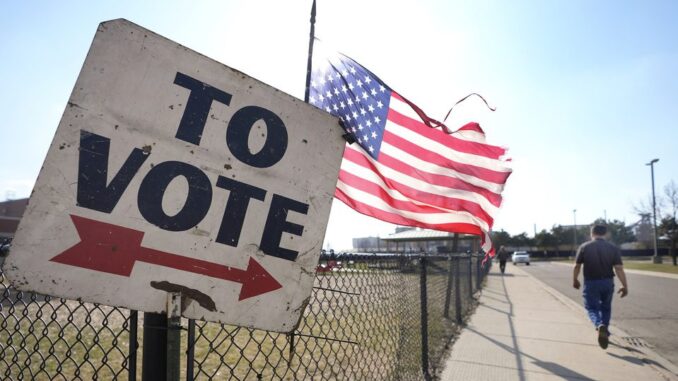
This November, Americans will go to the polls in what everyone seems to agree is “The Most Important Election of Our Lifetime!”
Democracy? Personal liberty? Capitalism? The future of Europe? It’s all on the ballot.
And you thought it was just going to be Trump or Biden.
Of course, this isn’t the first time we’ve been told that about an election. In 1936, voters were told:
“America is in peril. The welfare of American men and women and the future of our youth are at stake. We dedicate ourselves to the preservation of their political liberty, their individual opportunity and their character as free citizens, which today for the first time are threatened by Government itself.
“The powers of Congress have been usurped by the President.
“The integrity and authority of the Supreme Court have been flouted.
“The rights and liberties of American citizens have been violated. … To a free people these actions are insufferable.”
There were certainly some important issues in 1936. FDR had served two terms and was ignoring 150 years of precedent to run for a third term. He was defending his New Deal, which either helped begin to lead us out of the Depression or had been an enormous government overreach that went against the fabric of our nation. War was brewing in Europe, and, though it wasn’t known at the time, five seats on the Supreme Court were about to come open over the next four years.
That’s an important election. Maybe *The* Most Important one.
According to Slate, we’ve been holding “The Most Important Election” since at least the 1805 Pennsylvania governor’s race, when the phrase was first used. In the 219 years since, we’ve had a constantly increasing level of urgency, with each subsequent election taking the title as TMIEOOL (The Most Important Election Of Our Lifetime).
There are a couple of simple reasons why we feel this way. One is that creating urgency, whether merited or manufactured, is a good way to get your supporters to turn out.
“This November, you will decide whether we pay a little more in income tax or a little less” doesn’t have quite the same “get to the polls” pressure, does it?
The other big reason each election seems TMIE is an obvious but important fact about human nature:
We don’t know what’s going to happen.
We do know what happened in all those other TMIEOOLs, though: All the disasters — natural and man-made — and how they were handled. We know about the economy, the wars and the gaffes.
So, let’s take a look back to figure out which election was really “The Most Important”?
The three clear-cut choices for Most Important Election are:
- 1944: We were about to elect the person who would be presented with the atomic bomb and have to weigh the merits of using it.
- 1940: War raged in Europe and the U.S. would be attacked 13 months after Election Day.
- 1860: The election would determine if states seceded from the Union and, soon after, went to war with it. It doesn’t get much more Most Important than that.
There are other candidates in the honorable mention section. 1796 was the first election not involving George Washington. 1800 was referred to as “the Revolution of 1800.” There were the post-Lincoln elections as the country tried to recover from the Civil War, with 1876 perhaps being the most consequential. It turns out presidential elections have always been fairly important in our country.
Who knew?
But what about the end of that phrase: Of Our Lifetime. Here are the rankings:
- 1980: The outcome of the election would determine if the American hostages in Iran would be freed. Plus, growing tensions with the Soviet Union, an economic recession and the emerging HIV pandemic were all on the horizon. The contrast between the candidates — mild-mannered incumbent Jimmy Carter and smooth-talking cowboy Ronald Reagan — also underscored the different paths the election could take us.
- 2016: Again, the contrast between the two candidates — Hillary Clinton and Donald Trump — added to the importance of the choice. We didn’t know it, but the winner would be hit with a worldwide pandemic, and three Supreme Court seats, enough to sway the court far in one direction, were about to come open.
- 2000: Vice President and climate activist Al Gore vs. another cowboy in George W. Bush. Clearly, the candidates had vastly different priorities, presenting us with two divergent paths, intersected by an unprecedented attack on American soil eight months into their term.
In hindsight, those elections were more important than all the others. Unless you count this November, which, of course, will be TMIEOOL.
